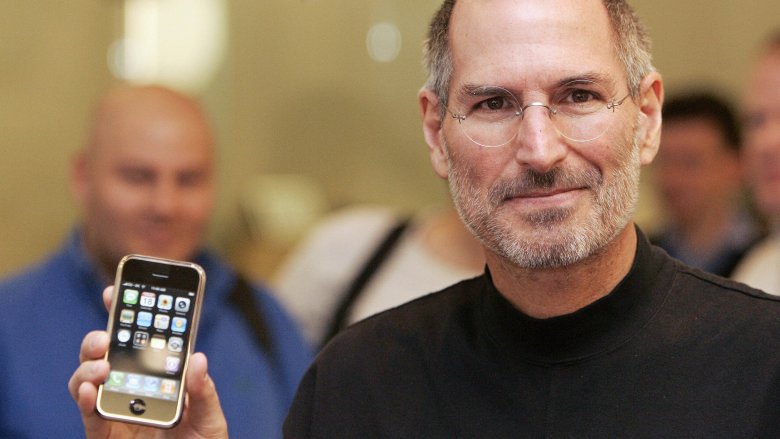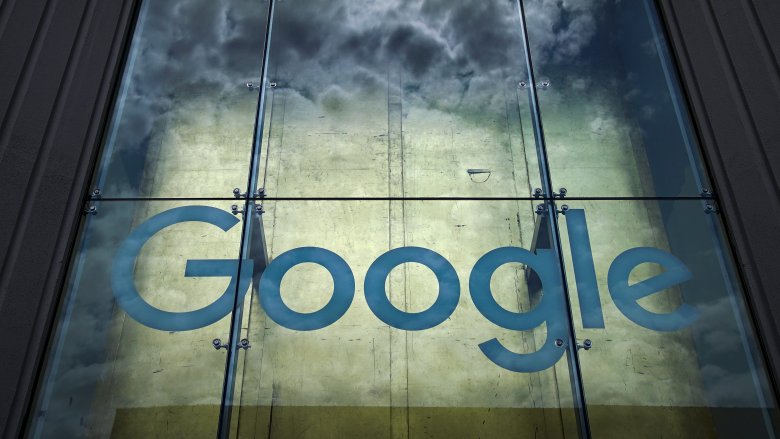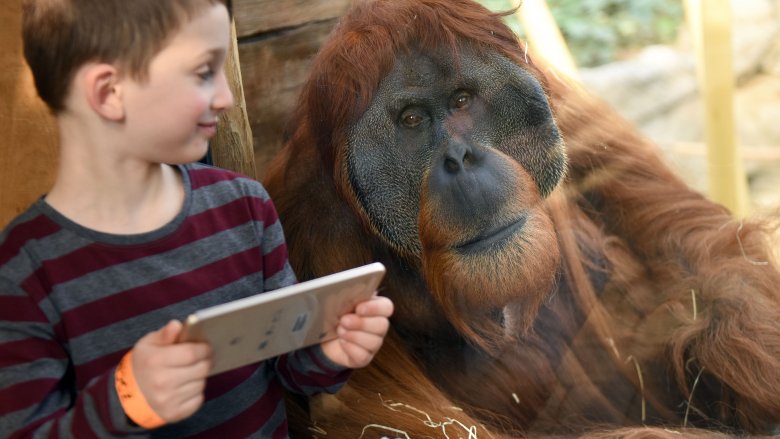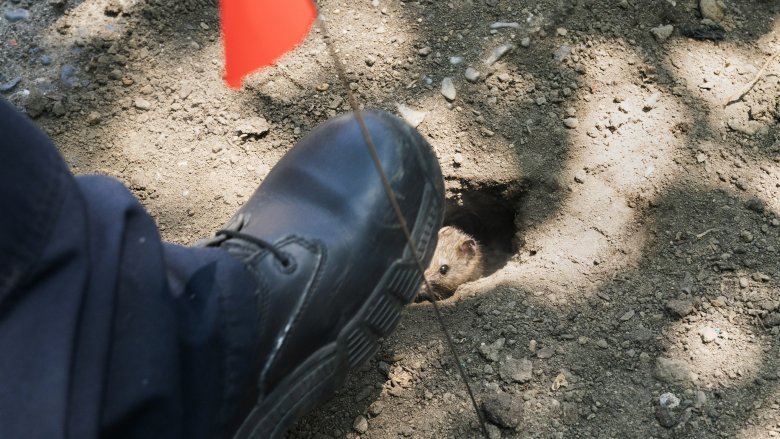April Fool's Jokes That Turned Out To Be Real
Ah, April Fool's Day. There might be no holiday that so aggressively fragments the population. Some people spend the entire year devising devious ways to prank their friends. Others brandish tiny violins as part of their annual rant about how pranks aren't funny. Then, saddest of all, there are the poor, unfortunate acquaintances of the first group, who are targeted by these practical jokes year after year. Hopefully, they have a sense of humor.
Naturally, in the 21st century, the internet has only made April Fool's Day into an even more widespread event of horror, laughter, and menace. These days, every April is launched by a parade of popular websites and massive tech companies who deviously pull the wool over everybody's eyes with headlines and products that seem too crazy to be true ... and usually are. Every once in a while, though, an April Fool's joke ends up catching fire, collecting fans, and turning into something real.
Calm down, Star Wars fans
These days, it seems like Star Wars fans violently argue with one another about almost everything, whether it's Jar Jar Binks or Supreme Leader Snoke. One thing that everyone can agree on, though — whether you're a casual observer, a prequel lover, or a sequel trilogy devotee — is that The Empire Strikes Back rocks. As you probably remember, one of the more bizarre moments from the beginning of the 1980 movie occurs when the ever-impulsive Han Solo cuts open the dead body of a tauntaun (the snowy, camel-looking thing) and stuffs his frostbitten buddy Luke Skywalker inside, so the poor wannabe Jedi isn't killed by the subzero temperatures of Hoth.
Effective? Sure, but a bit gross.
On April Fool's Day 2009, ThinkGeek lampooned the infamously obsessed Star Wars community by claiming they were now selling a tauntaun sleeping bag, according to the AV Club, which would allow kids to crawl into their own plush tauntaun carcass and nestle into the gray intestines for warmth. Rather than being offended, Star Wars fans were psyched ... so psyched, in fact, that they flooded ThinkGeek with requests for a real tauntaun sleeping bag. ThinkGeek contacted LucasFilm, and LucasFilm never argues with any excuse to print money, so by October of that year, Gizmodo reported that the dead tauntaun sleeping bags had become a real thing. Grab one for your next winter camping trip!
Behold! The iPhone cometh (three years early)
Touchscreen smartphones are such a ubiquitous part of 21st-century life that it's easy to forget that when Apple first announced the iPhone, plenty of people scoffed at it. Message boards lampooned the whole thing, social media wondered why Apple would kill their whole iPod line by producing such a similar product, and reviewers even complained about the digital touchscreen keyboard, according to Fast Company.
In retrospect, all this criticism is quite amusing. Even more amusing, though, is the fact that back on April Fool's Day 2004, a little site you probably haven't heard of called Pocket Lint posted a fake headline claiming that Apple had announced a mobile phone add-on for the iPod: i.e., the iPod would now have calling and texting in addition to its other features. Sounds pedestrian today, but obviously at the time, this concept seemed so thoroughly silly that nobody in their right mind would've listened. Just three years later, Steve Jobs and his elite crew announced that exact product via an official press release, and called it the iPhone.
Was Steve Jobs paying attention to a site named after the crap that accumulates in your pocket? Probably not. Regardless, it's hilarious that Pocket Lint called it first.
Strip away the jokes on April Fool's Day
Back in 2006, the Irish bookmaker company Paddy Power decided to have some fun for April Fool's Day by telling all their followers that they'd soon be staging the world's biggest strip poker contest, according to Card Player. While many saw the prank for what it was, numerous others were psyched about the opportunity to take their clothes off on the world stage, and then they were pretty disappointed to find out it wasn't real.
Well, score one for nudity because Paddy Power received so much enthusiasm for the fake strip poker contest that later that year they made it happen for real. In August 2006, 196 people competed in the Paddy Power World Strip Poker Championships in London for a chance to win a golden fig leaf trophy, £10,000, entry to a £2 million (non-strip) poker game, and another £10,000 donated to a charity of the winner's choice. The winner ended up being a guy named John Young, who successfully fought back against the legions of other players trying to take his clothes off.
Though the game was held in good fun, Poker News wrote that strict guidelines were maintained for the purpose of achieving a Guinness World Record. As of this writing, that record has not been broken. Perhaps finding almost 200 people willing to kick their pants off at the same time for a silly cause is a lot harder than you might think.
Pandas are welcomed to World of Warcraft
Even if you've never played Blizzard's Warcraft games, you might have lost family members or friends to the obsession. Or maybe you're just familiar with the South Park episode about the phenomenon. The point is, Warcraft fans take their game — and its lore — quite seriously. Introducing a new playable species into the mix is a big deal, and that's why some fans freaked when Blizzard pulled a 2003 April Fool's Day stunt by announcing the coming of the Pandaren (kinda sounds like "pandering," doesn't it?), a mystical race of anthropomorphized panda bear warriors driven from their homeland by big mean centaurs.
Nine years later, somebody at Blizzard decided to up the ante, and World of Warcraft's Mists of Pandaria expansion introduced the Pandaren for real. According to Engadget, much of the Warcraft community assumed this was yet another joke. Among those who believed it, plenty were unhappy with the development. As time went on, though, the real Pandaren overcame the haters to become a beloved race, with an intriguing back story, a love of home-brewed beer, and some fantastic character animation.
So yes, even the goofiest April Fool's jokes can become awesome realities with the right touch.
Google speaks for you on April Fool's Day
As the popularity of movies like The Terminator make clear, humankind is awfully worried about artificial intelligence rising up and exterminating the flesh pods. Nonetheless, laziness has a way of breeding new technological innovations.
That's why it was horrifyingly believable in 2009 when Google seemingly unveiled a new feature called Gmail Autopilot. According to the Museum of Hoaxes, the tech giant claimed Autopilot would read and reply to your email for you, and would even work if both the sender and receiver had Autopilot turned on, meaning two people could "converse" without actually conversing. Creepy stuff.
Apparently, someone at Google thought that this concept might have real potential. If you've used Gmail lately, you've probably noticed Google's new Smart Replies feature. Smart Replies, as explained by Verge, is the program that offers up those canned responses whenever you're composing an email, ranging from basic positive reinforcements like "Sounds good!" to vague promises like "Thanks, I'll check it out!" These personalized recommendations are only one step away from the prank Google made in 2009, considering that now — in real life — a sender and recipient really could converse with each other just by clicking Google's Smart Replies. Hmm, maybe Skynet isn't quite so far away, either.
Drop that cash, you April Fool
These days, you probably use a debit or credit card for just about everything except buying stuff on Craigslist. Still, if the New York Times had printed a headline claiming that the U.S. government had demonetized your $20 and $100 bills, reducing them to useless green papers — overnight! — you'd probably be a tad skeptical. That's how the people of India felt on April Fool's Day 2016, when, according to the India Telegraph, the Akila local newspaper ran a goofy story about how Prime Minister Narendra Modi, who had come to power on the promise of removing corruption, was going to cut back on black market money (i.e., cash exchanged by criminals, with no taxes paid) by removing two common forms of cash from circulation, the Rs 500 and Rs 1,000.
Everybody got a good, hearty laugh out of this prank. Such a thing would never happen! But then...
Seven months later, this exact policy came to pass. Those very two forms of cash were demonetized overnight, rendering all Rs 500 and Rs 1,000 notes useless, and forcing Akila newspaper editor Kirit Gantara to plead with swarms of angry critics accusing him of issuing real news, months ahead of time, under the guise of a prank. Unfortunately for them, getting angry at the guy who played a joke never goes well, and it certainly did nothing to reverse the government's anti-black market policy.
Pocket Lint strikes again!
You wouldn't think much of a site with a name like Pocket Lint, but evidently these folks are the kings and queens of technology predictions. Need more evidence? In 2009, Pocket Lint ran an April Fool's story about a supposed new phone app on the iPhone, Android, Blackberry, and S60, called TEXT 'N' WALK. The joke was, y'know, fairly obvious: Given that people spend so much of their lives sucked into their phone screens that they barely notice the real world, the fictional TEXT 'N' WALK was marketed as a tool that would use your phone camera to show a little screen of whatever was in front of you. It would allow you to text your date and walk to the coffee shop, simultaneously without ever looking away from your home.
The funniest part? Pocket Lint nailed the punchline because just one month later, Gizmodo reported that the app had become real. Called Email 'n Walk, the actual version was designed to have the text overlay the camera image, allowing more visibility. Lest you think this was another joke, an even fancier take on the idea came out in 2014, according to the Independent, called Type n Walk.
Jeez, people really hate looking away from their phones, huh? Anyhow, if you ever want to know what the future of cell phone technology is going to look like, it's probably a good idea to monitor Pocket Lint headlines every April.
Monkeying around on April Fool's Day
The sensationalist headlines that emerge from British tabloid The Sun aren't exactly prized for their credibility. When you pair that with April Fool's Day, you end up with silly nonsense like the paper's 2011 story "Planet of the Apps," claiming that the captive gorillas in a zoo had been given iPads, and that they had become huge fans of the Angry Birds game.
Totally fake, but across the pond in Wisconsin, a freelance photographer and Milwaukee County Zoo volunteer named Scott Engel took notice. According to the New Scientist, Engel gave the zoo his old iPad and suggested they have the gorillas try out the same finger painting app that his 3-year-old niece enjoyed. The gorillas didn't enjoy it that much — eye-contact is a threat in gorilla culture, which might make the faces on the screen seem off-putting — but when the iPads were tried out on the orangutans, they loved it. Orangutans are known for their intelligence and creativity, and iPads are actually small potatoes compared to the touchscreen computers the apes have been using in the Atlanta Zoo, or the computers they use to communicate with zookeepers in Washington D.C.
The iPad-using apes in Wisconsin, though, caused a big enough stir that the conservation group Orangutan Outreach launched the Apps for Apes campaign that same year, hoping to raise awareness of the risky status of orangutans in the world today. As Scientific American points out, the species is critically endangered.
Pokemon Go started as an April Fool's joke
These days, everyone knows Pokemon Go. The game was a brightly colored revolution that send countless kids and adults trekking through every neighborhood in search of Pokemon creatures that had been implanted into real-life settings using virtual reality technology that would've seemed impossible only a decade ago. But hey, here's the funny thing about Pokemon Go: It started as an April Fool's Day prank by Google in 2014 under the headline "Become a Pokémon Master with Google Maps." The actual "game," if you can call it that, simply placed Pokemon on the classic Google Maps screen as if they were locations, but the press release did feature a crazy video of people hiking mountains or trekking through streets to find Pokemon ... you know, the same thing gamers would later actually do once Pokemon Go got big.
How did this idea go from joke to real phenomenon? The credit for that, according to the Washington Post, goes to John Hanke, the chief executive of Niantic Labs, who had the ingenious idea of pairing Google's playful concept with the augmented reality of their previous game, Ingress, which had applied science fiction concepts to real-world location scouting. Hanke's efforts were clearly a success, considering all the Pokemon fans who invaded your local parks in search of a Charizard.
Time to fix your rat problems
You know one thing you really, really don't want to find in a restaurant, unless you live in a Pixar movie? A history of rat problems. Yuck. These issues can get particularly hairy in congested big cities, which is why in 2007, CNET pulled an amusing April Fool's Day prank by announcing the creation of a fictitious app called Ratattle, which would use Google Maps to let users "tattle" on any New York City food establishments they spotted a rat in, and thus allow future diners to know which places to avoid.
Though the story went a bit far with the details of the app — features like "RatRank," to rate the scariest looking user-submitted rodent features, were definitely a stretch — many readers thought the app sounded like a genuinely good idea. So did the city of New York. As CNET bragged the following year, New York City health officials turned the concept into a website where users could use a maps feature and help create a full directory of which local restaurants had rat-related health code violations. This not only allowed diners to see if the local McDonald's had a history of rat problems, follow-up inspections, and so on, but also became a neat tool to gather data for scientific research.
The vermin-ridden restaurants themselves probably weren't too happy about the city making it easier for people to rat on them, but hey, hopefully it inspired some better hygiene.
The April Fool's Lifetime movie that was (or wasn't, or was again?) real
All right, folks. Buckle your seatbelts for one of the most convoluted April Fool's stunts of all-time. To start at the beginning: on April Fool's Day 2015, the Hollywood Reporter revealed that Will Ferrell and Kristen Wiig had teamed up to produce a top-secret TV thriller for Lifetime titled A Deadly Adoption. Now, if you've ever seen a Lifetime original movie, you know how cheesy and overblown they get, and A Deadly Adoption's supposed plot regarding a sinister adoption scenario definitely fit the bill. But ... Will Ferrell? Kristen Wiig? Doing a Lifetime movie, of all things? Given that the article was posted on April Fool's Day, everyone laughed it off as an April Fool's prank.
Then, on April 2, Entertainment Weekly reported that Ferrell and Wiig were so disappointed about A Deadly Adoption's existence leaking that they'd canceled the film altogether. Say what? At this point, nobody knew what to think. Two months later, the AV Club wrote that not only was the movie real, but it had not been canceled and it would premiere on Lifetime later in June. (It eventually garnered 6 million viewers, according to THR.)
Honestly, it's hard to deduce exactly what happened. Was the cancellation the true prank, or was the entire idea to do a "reverse" April Fool's prank by making everyone think the movie was fake? In the end, though, the movie really happened and left everyone thoroughly confused.











